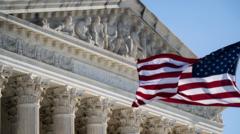The Trump administration is making headlines as it approaches the highest court in the United States to defend the controversial firing of Hampton Dellinger, the former head of the Office of Special Counsel (OSC). Dellinger, who was dismissed via a brief email, has initiated a legal battle against the administration, claiming that his termination violates federal law designed to protect independent agency leaders from being removed without just cause.
The situation escalated when a federal judge granted Dellinger temporary relief, allowing him to retain his position while the case works its way through the legal system. Following this, a divided court of appeals in Washington D.C. denied the administration's appeal, leading the Justice Department to file an emergency request with the Supreme Court. This marks the first instance where Trump has sought Supreme Court intervention since taking office just a month prior.
In the filing, acting solicitor general Sarah M. Harris argued that the judiciary should not intervene in executive employment decisions, stating that no precedent exists for forcing a president to retain an agency leader against their will. This challenge reflects a broader strategy by Trump to decrease the size and influence of the federal workforce, having already terminated over a dozen inspectors general and thousands of other employees across various agencies since taking office.
Amidst these firings, letters informing probationary employees of their terminations have reportedly circulated, citing unsatisfactory performance as justification. These measures are seen in the context of a larger push for efficiency within the federal workforce, aligning closely with the goals of a governmental efficiency task force led by tech entrepreneur Elon Musk.
While Trump's administration undoubtedly faces legal headwinds regarding its personnel decisions, this trial could set an important precedent influencing the limits of presidential authority over independent agencies in the future.



















